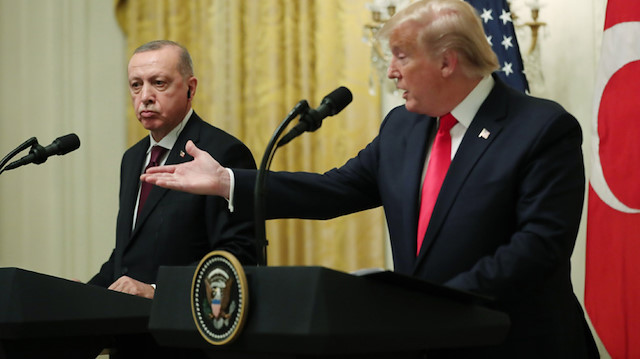

President Donald Trump and his Turkish counterpart Tayyip Erdoğan
U.S. President Donald Trump on Wednesday told Turkish President Tayyip Erdogan that his country's purchase of a Russian missile defense system was a "very serious challenge" for the United States but that he hoped the NATO allies would be able to resolve that dispute.
After a much anticipated meeting at the White House to address a crisis in relations, Trump said he was "a great fan" of the Turkish leader and that they had a "wonderful and productive" encounter. They did not, however, reveal any major breakthrough on mounting differences, from Syria to the Russian system known as S-400.
Trump's warm welcome for Erdogan, however, was a sharp contrast to anger in the U.S. Congress over Ankara's operation into Syria to drive out the YPG terror group from the region.
Trump brought in five Republican senators to the White House to speak with Erdogan about the YPG and the delivery of S-400s, which prompted Washington to remove Turkey from the F-35 fighter jet program, in which Ankara was a manufacturer and buyer.
"Turkey's acquisition of sophisticated Russian military equipment, such as the S-400, creates some very serious challenges for us and we are talking about it constantly," Trump told a joint news conference.
"We talked about it today, we're talking about it in the future, hopefully we'll be able to resolve that situation."
Erdoğan said that the two countries could only overcome their dispute on the S-400s and F-35s through dialogue.
The NATO allies, who boast the two largest armies in the alliance, have been at loggerheads for months now and their ties hit a new crisis point last month when Erdogan began his cross-border incursion against the YPG in Syria and upended the U.S. presence there.
Turkey shrugged off threats of U.S. sanctions and began receiving its first S-400 deliveries in July, but so far, the United States has not imposed any sanctions.
In the news conference, Erdogan was critical of the U.S. Congress, particularly of a House of Representatives vote last month in favor of a non-binding resolution recognizing the events that took place in Turkey in 1915 a century ago as a "genocide" against the Armenians.
#Turkey
#Trump
#Erdoğan
#YPG

